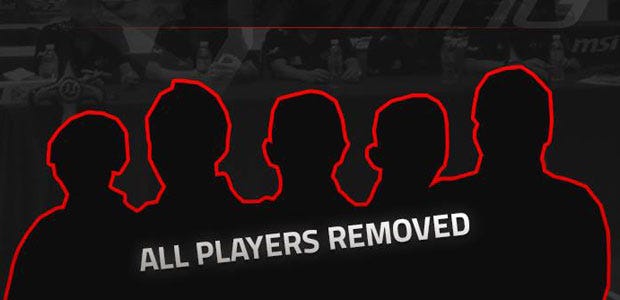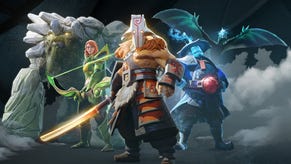Dote Night: Dota 322
Match-fixing in Dota 2
Part of a miscellany of serious thoughts, animal gifs, and anecdotage from the realm of MOBAs/hero brawlers/lane-pushers/ARTS/tactical wizard-em-ups. One day Pip might even tell you the story of how she bumped into Na’Vi’s Dendi at a dessert buffet cart.
If you've been keeping an eye on the Dota 2 community this past week you've probably seen the number 322 popping up repeatedly. "But why is everyone so interested in a Crystal Palace bus route?" you probably asked yourself. Alas, it's not a reference to the transport systems of South London. It's because of a series of match-fixing incidents which have been uncovered in South East Asia and which involve the teams Arrow Gaming, MSI and Mineski.
322 is shorthand for match-fixing. It comes from an incident in 2013 where Aleksey 'Solo' Berezin of RoX.KiS bet against his own team in a match against zRage. According to a statement from RoX.KiS' manager. Solo did everything he could to make sure the team went on to lose the match. His winnings came in at $322 (although once the match-fixing came to light that money was never paid out). Solo was given a lifetime ban from StarLadder competitions which was later reduced to one year.
I became aware of 322 while taking a quick break from League of Legends prep on the eve of Worlds. There's a Dota tournament called The Summit 2 which is being hosted by the Beyond The Summit organisation. The South East Asia qualifiers for that are taking place at the moment so I figured I'd just check in and see how the matches were going.
"Following recent investigations into various games where match-fixing was suspected we'll be disqualifying Arrow effective immediately from The Summit 2," was how it was going.
A few days prior to the Beyond The Summit announcement members of two teams from the Philippines – MSI and Mineski – had also admitted to match-fixing. Screenshots appeared on one of the Dota 2 subreddits which raised questions about potential match-fixing in a game between MSI and Mineski (one whose result wouldn't impact the outcome of the overall tournament). MSI's official response at the time was that they would investigate but that "anyone can print screen any conversation of two people talking about our players but that doesn't necessarily mean its true. We trust and know our players."
The accusations were backed up by suspicious betting activity noted by GosuGamers on that particular match as well as another involving Mineski. Dota2Lounge (a trading and betting site) would also go on to confirm bets supporting the theory which were linked to three MSI players and one Mineski player. A few days after the initial screenshots were posted eight of the players confessed and resigned from their teams.
"It's very unfortunate to announce that our players who we trusted our name to admitted that they did throw the game," was MSI's official response. They rounded off the statement by saying they would be looking for a new Dota 2 squad.
Arrow Gaming's situation is slightly more complex. You might know the team name because they attended The International 4 earlier this year as winners of the South East Asia qualifiers. Investigating the betting history of people linked with the MSI/Mineski scandal had apparently uncovered large bets on an Arrow Gaming Synergy League match. Further investigation showed new accounts with large bets as well as bets made by the girlfriends of team members DDZ and Lance. Former Titan manager Tiffani 'Oling' Lim did some digging and you can read the resultant timeline of cover-ups, statements and threats on her Reddit post – it's thorough.
Arrow Gaming were actually taking on Invasion at the time the exact time the announcement of their disqualification was made. The explanation given by BTS's David 'GoDz' Parker was that the final decision on the investigation into Arrow was only reached after that match was underway. It was one of the strangest matches I've ever sat through. The commentators knew it was meaningless and that Arrow were being disqualified and yet the match wasn't going to be cut short.
Watch live video from BeyondTheSummit on Twitch
[Starts at about 05:45:00]
I suspect the decision to announce as soon as possible was because Beyond The Summit's priority was keeping the legitimacy and integrity of their competition intact. They wanted to voice their determination to weed out unsporting behaviour and to start distancing themselves from the taint of match-fixing as soon as possible. As for keeping the match going, it sounds like BTS struggled with how to handle the unfamiliar situation. "Telling the team and stopping the game part way through is awkward and shitty and so is not telling them," was GoDz' response on Reddit. They settled on this peculiar middle ground where some people knew and others didn't. Twitch chat was awash with links to explanations and confusion.
One response to all of this is to ask why you'd risk your career for this. After all, Arrow qualified for TI4 and that has a prize pool of millions...
A statement posted by DDZ on Facebook says:
"We considered doing it in the first place because we were desperate for money. We live in the city, and being underpaid, things are just very tough and harsh on us sometimes. We are very very sorry for this action and we should have never done it. [...] We are also very sorry that we were too stupid to realize how unethical it was… we are sorry for everything that we have done. We have betrayed our fans’ trust and faith in us, and we will never forgive ourselves. We hope that you can forgive us even after all we’ve done. Thank you."
The chance to make apparently easy money in games which don't impact tournaments is the most obvious explanation. Talking in general, professional players can really struggle financially. Sure, the teams at the top of the top tier can net some great prizes but if you're lower down the ladder and not part of a salaried team you're living from paycheque to paycheque, from win to win. There are also potential issues like tournaments paying late and how teams divide up the winnings.
From that statement it also sounds like the players didn't feel like their actions had consequences. That's possibly because when you're using matches which don't have a bearing on the result of tournaments it might feel like no-one gets hurt.
I've posted about this because I think it raises important issues about maintaining trust within the eSports community as well as touching on the psychology of why we cheat and potential issues around how professional players are paid. I've been emailing tournament organisers to talk to them about how they deal with cheating and allegations of unfair conduct and trying to dig into bits of scientific research on the subjects. I'll be posting the fruits of that next week but in the meantime I wanted to provide the basic background information. As eSports grows the way organisations deal with accusations of cheating will be vital in maintaining the trust and affection of viewers.
















